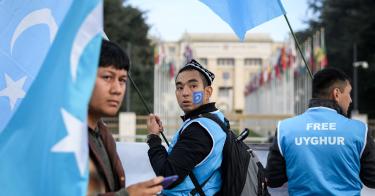At least one million Muslim Uyghurs have been confined to concentration camps in the People’s Republic of China’s Western province of Xinjiang. In one day alone last month in Russia, 5,400 political protesters were arrested decrying the detention of Putin critic Aleksei Navalny.
Where is the United Nations Human Rights Council (HRC), putatively the world’s premier guardian of human rights and fundamental freedoms? Absent. Notwithstanding, as promised, the Joe Biden Administration announced that the United States would rejoin the Council as an observer, reversing a Trump Administration decision to leave it in 2018.
The Biden administration is casting its decision as a means to improve the Council. As the Secretary of State Tony Blinken noted in the announcement, “We recognize that the Human Rights Council is a flawed body, in need of reform to its agenda, membership, and focus, including its disproportionate focus on Israel.” Disproportionate barely covers it: alone among the world’s countries, Israel is subject to a separately focused so-called “Agenda Item,” number 7, titled “Human rights situation in Palestine and other occupied Arab territories.” Every other country in the world is examined under Agenda Item 4, titled “Human rights situations that require the Council’s attention.”
>>> The Threat to Human Rights From the United Nations' Abuse of Human Rights
But even that singular agenda item is not enough. The HRC currently has eleven “country mandates” that focus on human rights situations in problem countries such as North Korea. All of these mandates are subject to periodic renewal except for the “Special Rapporteur on the situation of human rights in the Palestinian territories occupied since 1967” that remains in place “until the end of the Israeli occupation.” Unsurprisingly, Israel was the focus of ninety of 217 condemnatory resolutions (41 percent) adopted by the HRC from 2006 through 2020.
But the Council’s obsession with Israel is only the tip of the iceberg of HRC failures. Blinken insists that “[w]hen it works well, the Human Rights Council shines a spotlight on countries with the worst human rights records and can serve as an important forum for those fighting injustice and tyranny.” True, when it is not attacking Israel, the Council can condemn human right situations in pariah states like North Korea or adopt resolutions requesting technical assistance with willing governments such as Georgia.
But when it comes to the tough cases and influential governments, the Council is almost invariably silent. Specifically, the HRC has been unable or unwilling to adopt resolutions condemning serious human rights abuses by China, Cuba, Russia, Saudi Arabia, Zimbabwe, and other human rights offenders, even when the United States was a member of the Council.
The Biden administration, surely not blind to the Council’s defects, maintains that the American “withdrawal in June 2018 did nothing to encourage meaningful change, but instead created a vacuum of U.S. leadership, which countries with authoritarian agendas have used to their advantage.” Their language echoes the Obama administration’s 2009 decision to join the Council, which the Bush Administration had shunned. Like Biden’s, the Obama administration also believed that by “working from within, we can make the Council a more effective forum to promote and protect human rights. We hope to work in partnership with many countries to achieve a more effective Council.”
But evidence is scant that the United States was able to reform the Council’s Israel-hatred or shift its gaze to the world’s worst human rights abusers. Improvements on the margins hardly trumped the Council’s gravest sins, nor mitigated its betrayal of those who need it most in the world. U.S. engagement during the 2011 mandatory review of the HRC changed almost nothing, evidenced by the recent election of China, Cuba, Pakistan, and Russia to the Council last fall.
>>> Can Human Rights Be Rescued From Human Rights Activists' Overreach?
In reality, the Council’s problems have been intrinsic since its establishment in 2006 (itself a successor to the failed U.N. Human Rights Commission). Those issues have persisted whether the United States was present or absent. The root of the trouble is that the Council has no credible standards for membership. Governments deemed “not free” and “partly free” by Freedom House have historically comprised a majority of the HRC membership. Not even the world’s most repressive regimes have been excluded. Currently, in addition to the newly elected authoritarian governments listed above, human rights exemplars Eritrea, Somalia, Sudan, and Venezuela also sit on the HRC.
These governments have no interest in addressing their own human rights shortcomings, let alone those of others. They actively impede the Council’s mandate to promote human rights and address and respond to human rights emergencies—unless, of course, there is an opportunity to advance a political agenda by criticizing the America or Israel.
The U.N. General Assembly is scheduled to review the Council between 2021 and 2026. That is, we argued last year, an opportunity for the United States to propose substantial reforms. But in rejoining the Council before laying out its own agenda for change, the Biden administration has squandered its leverage. Without reform, the Human Rights Council will continue to fail those who need it most. Shame on them; shame on us.
This piece originally appeared in The National Interest https://nationalinterest.org/feature/america-should-not-have-rejoined-flawed-united-nations-human-rights-council-177892




